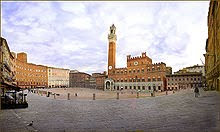Italy (pronounced / Italian: Italia, officially the Italian Republic (Italian: Repubblica italiana), is a country located partly on the European Continent and partly on the Italian Peninsula in Southern Europe and on the two largest islands in the Mediterranean Sea, Sicily and Sardinia. Italy shares its northern, Alpine boundary with France, Switzerland, Austria and Slovenia. The independent states of San Marino and the Vatican City are enclaves within the Italian Peninsula, and Campione d'Italia is an Italian exclave in Switzerland. The territory of Italy covers 301,338 km² and is influenced by a temperate seasonal climate. With 60.4 million inhabitants, it is the sixth most populous country in Europe, and the twenty-third most populous in the world.
Italy's capital, Rome, was for centuries the political centre of Western civilisation as the capital of the Roman Empire. After its decline, Italy would endure numerous invasions by foreign peoples, from Germanic tribes such as the Lombards and Ostrogoths, to the Normans and later, the Byzantines, among others. Centuries later, Italy would become the birthplace of the Renaissance, an immensely fruitful intellectual movement that would prove to be integral in shaping the subsequent course of European thought.
Through much of its post-Roman history, Italy was fragmented into numerous kingdoms and city-states (such as the Kingdom of Sardinia, the Kingdom of the Two Sicilies and the Duchy of Milan), but was unified in 1861, following a tumultuous period in history known as the "Risorgimento". In the late 19th century, through World War I, and to World War II, Italy possessed a colonial empire, which extended its rule to Libya, Eritrea, Somalia, Ethiopia, Albania, Rhodes, the Dodecanese and a concession in Tianjin, China.
Modern Italy is a democratic republic. It has been ranked the world's eighteenth most-developed country and its Quality-of-Life Index has been ranked in the top ten in the world. Italy enjoys a very high standard of living, and has a high nominal GDP per capita. It is a founding member of what is now the European Union and North Atlantic Treaty Organization. Italy is also a member of the G7, G8 and G20. It has the world's seventh-largest nominal GDP, tenth highest GDP and the sixth highest government budget in the world. It is also a member state of the Organisation for Economic Co-operation and Development, the World Trade Organization, the Council of Europe, the Western European Union and the United Nations. Italy has the world's ninth-largest defence budget and shares NATO's nuclear weapons.
Italy plays a prominent role in European and global military, cultural and diplomatic affairs, and it is affiliated with worldwide organizations such as the Food and Agriculture Organization, World Food Programme, International Fund for Agricultural Development, Glocal Forum, and the NATO Defence College, which are headquartered in Rome. The country's European political, social and economic influence make it a major regional power, alongside the United Kingdom, France, Germany, and Russia. The country has a high public education level, high labour force, and is a highly globalised nation
Excavations throughout Italy reveal a modern human presence dating back to the Palaeolithic period, some 200,000 years ago. In the 8th and 7th centuries BC Greek colonies were established all along the coast of Sicily and the southern part of the Italian Peninsula became known as Magna Graecia. Ancient Rome was at first a small agricultural community founded circa the 8th century BC that grew over the course of the centuries into a colossal empire encompassing the whole Mediterranean Sea, in which Ancient Greek and Roman cultures merged into one civilization. This civilization was so influential that parts of it survive in modern law, administration, philosophy and arts, forming the ground that Western civilization is based upon. In steady decline since the 2nd century AD, the empire finally broke into two parts in 285 AD: the Western Roman Empire and the Byzantine Empire in the East. The western part under the pressure of Goths finally dissolved, leaving the Italian peninsula divided into small independent kingdoms and feuding city states for the next 14 centuries, and leaving the eastern part sole heir to the Roman legacy.
Culture
Italy did not exist as a state until the country's unification in 1861. Due to this comparatively late unification, and the historical autonomy of the regions that comprise the Italian Peninsula, many traditions and customs that are now recognized as distinctly Italian can be identified by their regions of origin. Despite the political and social distinction of these regions, Italy's contributions to the cultural and historical heritage of Europe and the world remain immense. Italy is home to the greatest number of UNESCO World Heritage Sites (44) to date, and has rich collections of world art, culture and literature from many different periods. Italy has had a broad cultural influence worldwide, also because numerous Italians emigrated to other countries during the Italian diaspora. Italy has, overall, an estimated 100,000 monuments of any sort (museums, palaces, buildings, statues, churches, art galleries, villas, fountains, historic houses and archaeological remains






.jpg)

































-100207_a.jpg)



.jpg)


















صور حلوة كتير يسلمووووووووو ع المجهود
ReplyDelete